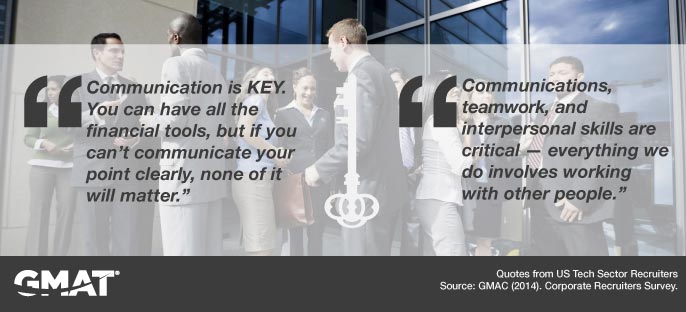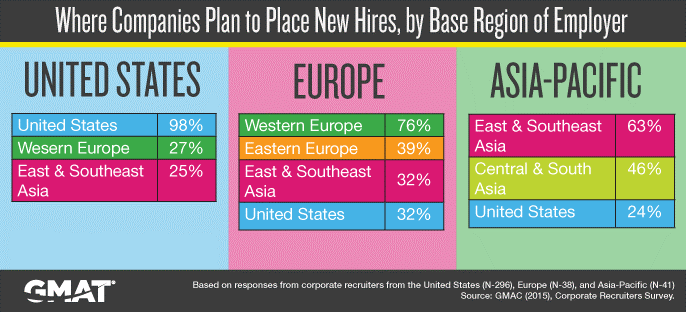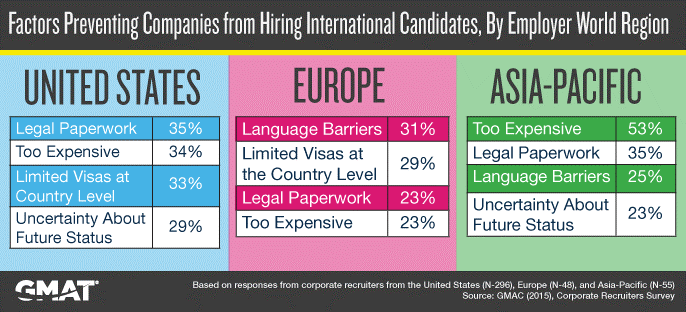Study Abroad, Work Abroad: International Job Search

An MBA can boost your opportunities for an international career.
Interested in an international career? You’re not alone. In 2014, nearly half of mba.com registrants indicated they were motivated to pursue a business degree to increase their opportunities for international employment.1
For these individuals, this means a career search outside of their country of citizenship that often includes obstacles related to language and cultural differences, issues surrounding legal documentation, and geographical distance, among other challenges.
To shed some light on the topic and provide some actionable advice, mba.com spoke with Marcelo Barros, author of The International Advantage. Get Noticed. Get Hired; and Sara Muriello, author of The American Mindset: Job Search Guidelines for International Graduate Business Students.
Self-Assessment: Align Your Skills and Goals with the Job Market
Employers are looking for soft skills—abilities like social perceptiveness, active listening, and being persuasive in written or oral communication.2 These soft skills are typically more difficult to master for job seekers outside of their native culture, and can often be a major stumbling point.

“Interpersonal skills are key to what employers seek, and critical for networking that can ensure career success,” Muriello noted. “Building soft skills is not something that happens over night—one must consciously make a continuous effort to expand and develop new skills, to create a sense of belonging and build confidence.”
As an International job seeker, you need to conduct a thorough self-assessment to ensure your skill set not only aligns with your desired job function, but with the current hiring landscape as well.
"Whatever your interest and skills are, you need to understand the market,” Barros explained. “Is there a demand for people with a particular set of skills, or is the market overflowing with domestic candidates for these roles? International students are more successful when they position their skillset around the needs of the market.”
Understand the Market and Set Realistic Expectations
So, what does the market look like? We asked employers about their hiring plans for 2015 and found that a larger percentage of companies plan to hire international candidates this year compared to last year across all world regions and industries in our sample. The industries most likely to have plans to hire international candidates are finance/accounting, consulting, manufacturing, and high technology, in that order.2
“Many large consulting firms serve a large number of clients with international operations, and their own operations are global. So being international can be an interesting match for their needs,” Barros said. “It is possible to succeed in any functional area; international students are not necessarily the underdogs in the job search race.”
A common assumption supported by GMAC data is that large companies are more likely to hire international candidates than smaller companies.2 “They have more resources, legal departments, and are global organizations,” noted Muriello.
While large companies present greater odds, Barros cautions not to dismiss opportunities at smaller, lesser-known organizations. “My experience with smaller firms is fewer layers of bureaucracy, much faster decision making, and a great need to attract good people. They may tell you they don’t sponsor international candidates, but once they get to know a candidate and the candidate effectively positions their skillset, that can change in a hurry,” he said.
Something to keep in mind is that companies often place international hires outside of the country or region where the company is based. For example, about a quarter of Asia-Pacific employers have plans to place international hires in the US this year.2

Part of understanding the market is setting realistic expectations for your search, and accepting that a multitude of variables outside of your control influence employer hiring decision-making. The figure below displays the factors corporate recruiters frequently say prevent them from hiring international candidates.

But to Barros, the truth is in the market: “The question of sponsorship tends to be dictated by the availability of a given skillset in the market. It’s not cost, paperwork, or language—it’s a supply and demand discussion. It’s incredible how the reasons cited in the survey disappear once a company needs the applicant. This is why we see so many technical roles available to international candidates—because there is an insufficient supply of domestic applicants.”
Maximize Your Opportunities for Success
Another facet of setting realistic expectations is making a plan to cast a wide net in your job search—something Muriello advises from the onset.
“Students should build an international target list that includes at least 30 different companies,” she explained. “At Simon [Business School] we have a three-pronged approach right from the beginning: job search in the US, home country, and multinational. This increases students’ job search success and opportunity in what is now a global marketplace.”
Though you may have a very specific job in mind for yourself, it’s important that you remain open to other opportunities that become available.
“Jobs change frequently in the US. Work is fluid,” explained Barros. “My pitch to students is ‘let’s move the ball forward.’ That could mean your first job out of school is not what you envisioned, and it’s not the role you thought you should get, but that doesn’t mean you have to keep the job forever. You need to get comfortable with the idea of mobility. So because the visa situation is tough, let’s put you in a situation where you are going to get a job out of school, so you can join the workforce and grow from there.”
 Marcelo Barros, a former international MBA student himself, is the founder of The International Advantage, LLC; a consulting firm focused on the job search needs of international students.
Marcelo Barros, a former international MBA student himself, is the founder of The International Advantage, LLC; a consulting firm focused on the job search needs of international students.
 Sara Muriello is the Cross Cultural and Communication Specialist at Simon Business School at the University of Rochester, and founder of Executive Cross Communication Consulting.
Sara Muriello is the Cross Cultural and Communication Specialist at Simon Business School at the University of Rochester, and founder of Executive Cross Communication Consulting.
[2] GMAC (2015). Corporate Recruiters Survey.



